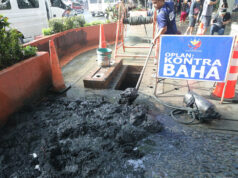National ID, SIM card registration touted as anti-terrorism measures by AMLC
THE national ID and the registration of SIM cards will help add teeth to enforcement efforts against terrorism financing, the Anti-Money Laundering Council (AMLC) said.
“(A) key element in the execution of unlawful activities, such as terrorism financing, is anonymity,” AMLC Executive Director Mel Georgie B. Racela said in a message to BusinessWorld.
Mr. Racela said the national ID and a SIM card registration bill “may aid law enforcement agencies in tracking down criminals and curbing illicit activities, such as terrorism financing.”
The national ID rollout has been hampered by the lockdown. Acting Socio-economic Planning Secretary Karl Kendrick T. Chua put the target at five million households registered this year starting November, a month behind the original October schedule.
Current legislation calling for SIM card registration include House Bill 5793 and Senate Bill 25, which have been pending since 2019.
The AMLC is currently investigating cryptocurrency transactions by Islamic State-linked (IS) groups.
“We are still waiting for the details from our intel agencies,” Mr. Racela said.
An earlier study this year by think tank Philippine Institute for Peace, Violence, and Terrorism Research said IS-linked terror groups have engaged in their first transaction in cryptocurrencies.
Mr. Racela said 2018 research by AMLC recommended measures such as more stringent know-your customer procedures and tougher due-diligence standards for payment partners of virtual currency exchanges such as remittance centers and mobile payment systems.
Mr. Racela said international cooperation is vital in monitoring virtual currency transactions, particularly those that trade outside virtual currency exchanges that are registered with the Bangko Sentral ng Pilipinas (BSP).
“All jurisdictions should regulate rather than ban virtual currency exchanges so that they can fall under the regulatory framework and be the subject of information-sharing space among financial intelligence units,” Mr. Racela said.
The Financial Action Task Force (FATF), an international dirty-money watchdog, released guidance in 2019 recommending a risk-based approach to virtual assets and virtual asset service providers in order to aid countries in addressing the increasing use of the medium for money-laundering and terrorism financing.
“For the Philippines… ensuring adoption of the new rules will be important to improve international consistency in regulatory oversight of virtual assets and to help mitigate weaknesses in the financial crime risk management framework overall,” Matt Ekberg, senior policy advisor at the Institute of International Finance said in an e-mail Saturday.
Under the New Central Bank Act signed into law in 2019, the BSP’s supervision has been extended to include virtual currency exchanges which fall under money service businesses.
BSP TO CONDUCT SECTORAL RISK ASSESSMENT
In Circular Letter 2020-032, signed on July 6, BSP Governor Chuchi G. Fonacier said the bank will be conducting a third sectoral risk assessment on anti-money laundering and counter-terrorism financing in the banking industry.
The assessment will cover accounts and transactions from 2017 to 2019 in priority areas such as cash, cross-sector and cross-border transactions as well as other key emerging risks in compliance with the recommended actions in the 2019 Philippine Mutual Evaluation Report.
“This exercise will involve the use of both quantitative and qualitative data/information from existing reports as well as the responses to the anti-money laundering and counter-terrorism financing Template and Questionnaire, among others,” Ms. Fonacier said.
The Philippines is in an FATF observation originally scheduled to end in October but extended to February due to the pandemic.
The Philippines is facing the risk of a possible inclusion in a “gray list” of countries that are deemed to have loose measures against money laundering and counter-terrorism financing if it fails to strengthen and implement measures against dirty money.
Legislation meant to address these shortcomings include the Anti-Terrorism Act which was signed into law last week. It revises the Human Security Act of 2007. Amendments to the Anti-Money Laundering Act are pending at committee level in both the House of Representatives and the Senate. — Luz Wendy T. Noble



